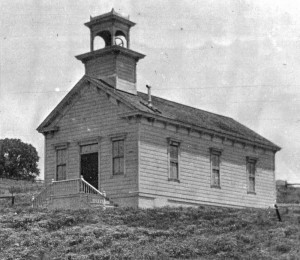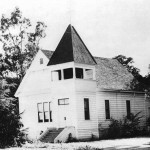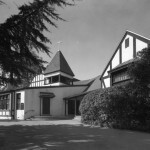How we got here....
The founder of the city of Lafayette and the first church in Lafayette was Elam Brown, a settler who led fourteen pioneer families to the Bay Area in 1846 while it was still Mexican territory. Elam became the second Yankee settler in Contra Costa County, where he purchased Rancho Acalanes in 1847 and then built his first Lafayette home.
The Lafayette Church was organized in 1855 by a group of citizens who met informally to hold occasional services in Mr. Brown’s home. Sunday School classes were conducted intermittently in his home starting in 1852. With a growing congregation, the need for a proper church became more evident. A church building was constructed in 1857 on leased land adjacent to a lot that would hold the city’s first school house. The building served the community without denominational affiliation for eleven years, and then became a congregation of the Methodist Episcopal Church. Subsequent mergers in the denomination meant a change of affiliation to the Methodist Church in 1939 and The United Methodist Church in 1968.
When the land lease expired with the death of its owner, the church building was moved to a lot donated by Elam Brown, where it remained for seven years. In 1886 Mr. Brown sold the former Good Templar’s Hall and property (which stood on a hill, since removed) to the Lafayette Methodist Episcopal Church. The bell and tower were taken from the old church and placed on the Good Templar’s building, which was dedicated in April, 1886, and became known as “The Church on the Hill.”
The Lafayette Church was organized in 1855 by a group of citizens who met informally to hold occasional services in Mr. Brown’s home. Sunday School classes were conducted intermittently in his home starting in 1852. With a growing congregation, the need for a proper church became more evident. A church building was constructed in 1857 on leased land adjacent to a lot that would hold the city’s first school house. The building served the community without denominational affiliation for eleven years, and then became a congregation of the Methodist Episcopal Church. Subsequent mergers in the denomination meant a change of affiliation to the Methodist Church in 1939 and The United Methodist Church in 1968.
When the land lease expired with the death of its owner, the church building was moved to a lot donated by Elam Brown, where it remained for seven years. In 1886 Mr. Brown sold the former Good Templar’s Hall and property (which stood on a hill, since removed) to the Lafayette Methodist Episcopal Church. The bell and tower were taken from the old church and placed on the Good Templar’s building, which was dedicated in April, 1886, and became known as “The Church on the Hill.”

Church on the Hill, c 1886

Bell Tower, 1928
In 1927, after selling The Church on the Hill, the congregation completed their final move. They purchased Lafayette’s third school building, a larger structure on Moraga Road, which provided the congregation with an assembly hall (sanctuary) and classrooms. The third school building had been constructed in 1893 with a bell tower and several classrooms. The flagpole on top of the belfry was replaced by a large cross. This belfry still rises noticeably over the sanctuary and lounge additions; part of the original school building remains, exactly as it was in 1928. This building is located in front of what was the second school, which was moved to a new location on Mt. Diablo Blvd. Our current Fellowship Hall now occupies the second school site.
Construction began in 1941 on a new sanctuary on the north side of the old church building; the sanctuary was completed debt free and dedicated in January, 1943. About 1948, a parlor was added, providing a new facade to the front of the old school building while still permitting the bell tower to remain a focal point.
A master plan for ultimate facility expansion was developed in 1953. Shortly thereafter, ground was broken for a new two story, eight classroom education building, just south of the original church building. In 1962, construction began on the Fellowship Hall, after demolition of classrooms at the rear of the old school building. This multipurpose building provides space for a classroom, two fireside rooms, including a library and reading room, restrooms, storage, a complete kitchen, and a hall with high ceilings, which makes it suitable for a variety of uses.
It became clear in the early 1960s that the seating capacity of the sanctuary needed expansion. A wide opening was cut into the rear wall of the sanctuary, opening it into the main room of the old school building. An expanding curtain was installed to allow the old room to be used separately or closed off when not needed.
Construction began in 1941 on a new sanctuary on the north side of the old church building; the sanctuary was completed debt free and dedicated in January, 1943. About 1948, a parlor was added, providing a new facade to the front of the old school building while still permitting the bell tower to remain a focal point.
A master plan for ultimate facility expansion was developed in 1953. Shortly thereafter, ground was broken for a new two story, eight classroom education building, just south of the original church building. In 1962, construction began on the Fellowship Hall, after demolition of classrooms at the rear of the old school building. This multipurpose building provides space for a classroom, two fireside rooms, including a library and reading room, restrooms, storage, a complete kitchen, and a hall with high ceilings, which makes it suitable for a variety of uses.
It became clear in the early 1960s that the seating capacity of the sanctuary needed expansion. A wide opening was cut into the rear wall of the sanctuary, opening it into the main room of the old school building. An expanding curtain was installed to allow the old room to be used separately or closed off when not needed.
In 1973, the Lafayette Historical Society dedicated the original third school building and its prominent bell tower as a Historical Monument. This honor prohibits altering or destroying any more of the original structure, though only portions of the original school and church building are recognizable. Primarily as a result of this limitation, it was decided to enlarge the sanctuary within the existing structure, extending it back to the south wall of the old school building, which was then structurally reinforced. This enabled the original Gothic style and appearance of the chapel to be preserved. The unified sanctuary was presented to the congregation in a service of rededication on Landmark Day, March, 1984.
In order to provide additional space, the pastor’s office was relocated from the sanctuary building to room 1 of the education building in 1987. The former pastor’s office was converted to an office for the music staff. In 1995, rooms 1, 2, and 3 of the education building were modified and refurbished to accommodate the new self-sustaining Joyful Beginnings Preschool.
Over the years, other changes have modified the site, including the addition of parking facilities; the construction (and subsequent relocation to Oak Hill Road) of a parsonage on what is now the playground area; modifications to Lafayette Creek, including a culvert, and a creek bank stabilization project to protect the northern foundations of the Fellowship Hall.
A “community” church from its inception, the Lafayette United Methodist Church has retained its heritage through the years as a center of worship, fellowship, teaching, and outreach. It was first called the Lafayette Community Church from 1932 through 1968, and was appointed to serve the spiritual needs of the entire community.
Christ’s church (where two or more are gathered together) is the vehicle by which blessings are made available to the community and the world. That is the real history of what the Lafayette UMC has provided for over 155 years.
In order to provide additional space, the pastor’s office was relocated from the sanctuary building to room 1 of the education building in 1987. The former pastor’s office was converted to an office for the music staff. In 1995, rooms 1, 2, and 3 of the education building were modified and refurbished to accommodate the new self-sustaining Joyful Beginnings Preschool.
Over the years, other changes have modified the site, including the addition of parking facilities; the construction (and subsequent relocation to Oak Hill Road) of a parsonage on what is now the playground area; modifications to Lafayette Creek, including a culvert, and a creek bank stabilization project to protect the northern foundations of the Fellowship Hall.
A “community” church from its inception, the Lafayette United Methodist Church has retained its heritage through the years as a center of worship, fellowship, teaching, and outreach. It was first called the Lafayette Community Church from 1932 through 1968, and was appointed to serve the spiritual needs of the entire community.
Christ’s church (where two or more are gathered together) is the vehicle by which blessings are made available to the community and the world. That is the real history of what the Lafayette UMC has provided for over 155 years.

1980s
